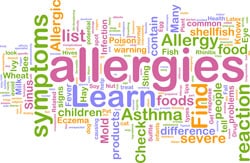In the midst of allergy season, controlling your itchy eyes and runny nose can seem like an endless undertaking. However, with help from your ear, nose, and throat doctor, you can overcome your symptoms to get back to your normal daily activities as soon as possible. Learn more about allergies and their treatments with Dr. Pankaj Gupta at Wake Ear, Nose, and Throat Specialists and Wake Sinus Center in Cary, NC.
What causes an allergy?
An allergic reaction occurs when a substance enters the body and the immune system mistakenly identifies it as a threat. The immune system then creates antibodies which attack the substance (now designated as an allergen). This triggers the production of histamines, which causes an expansion of the blood vessels and results in the symptoms we associate with allergic reactions. However, the body creates these antibodies particularly for each allergen, which is why someone may be allergic to pollen but not to peanuts.
Do I have allergies?
There are several types of allergies with their own kinds of symptoms:
Food allergies: A food allergy can cause issues like abdominal cramping, numbness in the face or mouth, swollen tongue, or difficulty swallowing. You may also experience skin irritations such as hives.
Seasonal allergies: Seasonal allergies cause reactions to substances like pollen or mold. The symptoms associated with seasonal allergies often include itchy, red, and watery eyes, runny nose, congestion, or a scratchy throat.
Skin allergies: Contact dermatitis, which occurs when the skin reacts to an allergen, causes issues like rashes and hives. This reaction occurs after the skin comes into contact with an allergen.
Drug allergies: Some drugs cause an allergic reaction such as a skin reaction like hives but can also cause fever, itching, wheezing, runny nose, or shortness of breath.
Allergy treatments in Cary, NC
Treating allergies depends on the type of allergens you are allergic to. Often, an over-the-counter antihistamine, which blocks the histamines produced during the allergic reaction, is enough to minimize the symptoms of an allergic reaction. Sometimes, patients require a stronger, prescription-strength antihistamine to treat their symptoms. Severe allergies require emergency medications like injectable epinephrine which patients carry with them in case of an allergic reaction. Finally, immunotherapy may also help some patients. It follows the same idea as a vaccination and introduces small amounts of an allergen into the body, building up a tolerance over time.
For more information on allergy treatments, please contact Dr. Pankaj Gupta at Wake Ear, Nose, and Throat Specialists and Wake Sinus Center in Cary, NC. Call (919) 851-5636 to schedule your appointment for a consultation with Dr. Gupta today!

